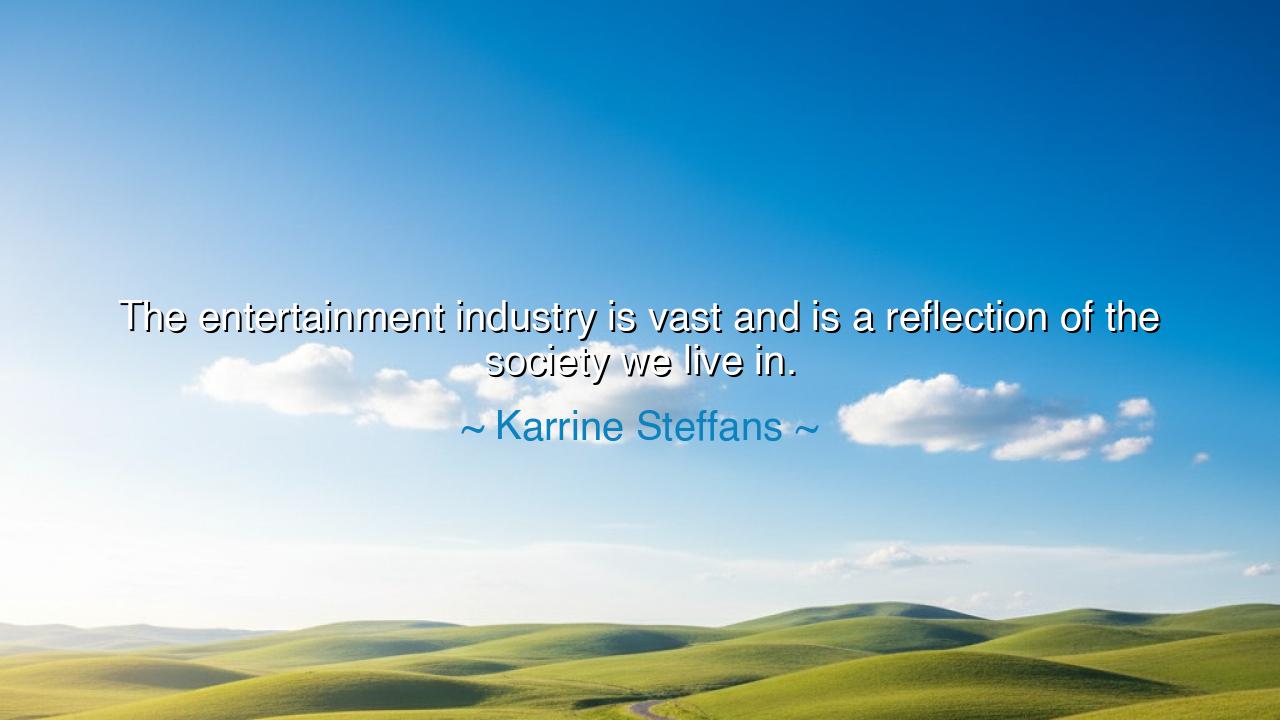
The entertainment industry is vast and is a reflection of the






Hear the words of Karrine Steffans, who lived within the very machinery of spectacle and thus spoke with unclouded clarity: “The entertainment industry is vast and is a reflection of the society we live in.” These words are not casual, but deliberate, reminding us that the songs we sing, the stories we tell, the images we consume are not mere amusements—they are mirrors. They echo back to us our longings and our sins, our desires and our deceptions, our greatness and our decay. The entertainment industry, vast like an empire, thrives only because it feeds on what society offers it; it is both creator and creation, both puppet and puppeteer.
The meaning is simple yet profound. People often look at the entertainment industry and condemn its corruption, its obsession with wealth, beauty, and fame. But Steffans reminds us: it is not separate from us. It is the child of our appetites, a mirror of our culture’s values. If the industry worships vanity, it is because society does; if it thrives on scandal, it is because society craves it; if it sometimes uplifts, it is because the people hunger for inspiration. To despise the industry is, in part, to despise ourselves, for it reflects our collective choices.
The ancients, too, knew this truth. In Rome, the gladiatorial games were the grandest entertainment industry of their time. The amphitheaters filled with citizens demanding blood, spectacle, and glory. The emperors obliged, for they knew that the games reflected Rome itself: its thirst for dominance, its appetite for violence, its pride in power. These games were not just staged; they were mirrors of the Roman soul. And when the soul of Rome grew corrupted, the games became grotesque parodies of virtue, heralding the empire’s decline. Thus Steffans’ words echo across centuries: the entertainment industry shows us what we already are.
Consider also the story of the Harlem Renaissance. In the 1920s and 1930s, Black artists, writers, and musicians reshaped American culture through jazz, poetry, and literature. Their works were not merely diversions; they reflected the struggles, hopes, and triumphs of a people long oppressed. The entertainment industry of that era became a vehicle for truth, a mirror of both injustice and beauty. Here we see the nobler side of Steffans’ insight: the stage and the screen, the song and the poem, can reflect not only decay but also resilience, dignity, and the soul’s unquenchable fire.
But we must not ignore the shadow. Today, when gossip tabloids thrive, when music videos glorify excess, when reality shows profit from humiliation, we must ask: what does this reveal of our society? It shows our hunger for escape, our fascination with wealth, our obsession with surfaces. These are not creations of the industry alone—they are reflections of us. To heal the culture, we must first heal the appetite that feeds it. The entertainment industry is vast, but it bends itself to our gaze, and it will mirror whatever it finds there.
The lesson is clear: do not dismiss art, film, music, or spectacle as trivial. Attend to them, for they are the polished mirror of our society. If we desire nobility, then let us demand it in our art; if we yearn for truth, then let us support voices that speak it; if we long for beauty, then let us not feed on ugliness. For what we watch, what we celebrate, what we pay for—these are not only entertainments, but lessons carved into the soul of our age.
What, then, must we do? Consume with wisdom. Support creators who reflect truth and not falsehood, dignity and not degradation. Teach children to see through the illusions of fame and wealth, and to look for stories that elevate the human spirit. And for those who create, understand the weight of your calling: you do not merely entertain—you shape the mirror of your time.
Thus remember: the entertainment industry is no stranger, no distant empire. It is us. It is the chorus of our desires, the stage of our virtues and vices, the song of our collective soul. Karrine Steffans speaks as one who lived within its furnace: if you wish to change what you see in its reflection, you must first change the face of society itself.






AAdministratorAdministrator
Welcome, honored guests. Please leave a comment, we will respond soon